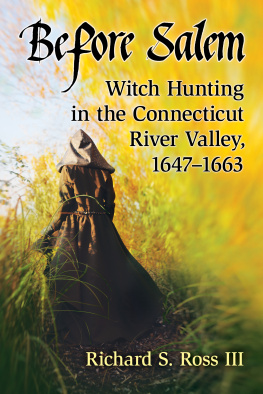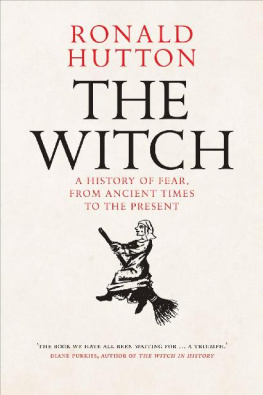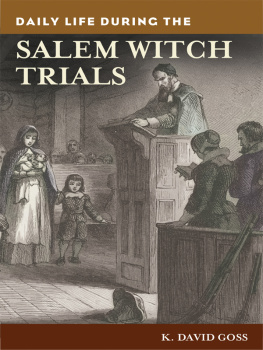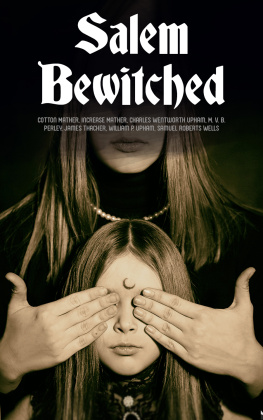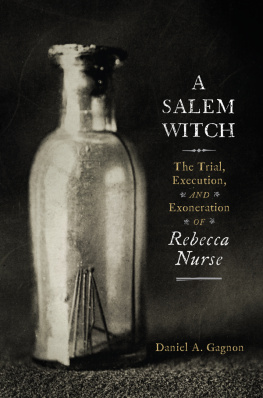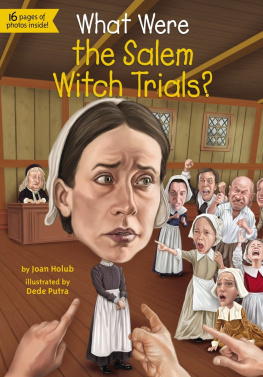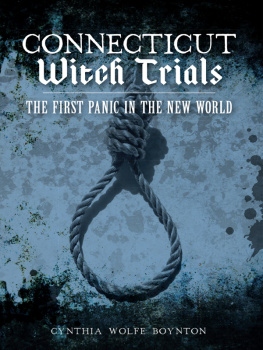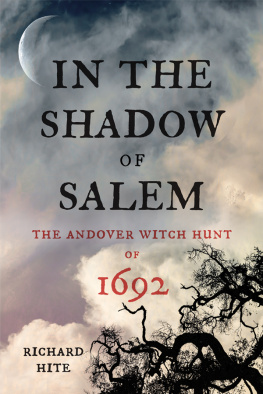Contents
Guide
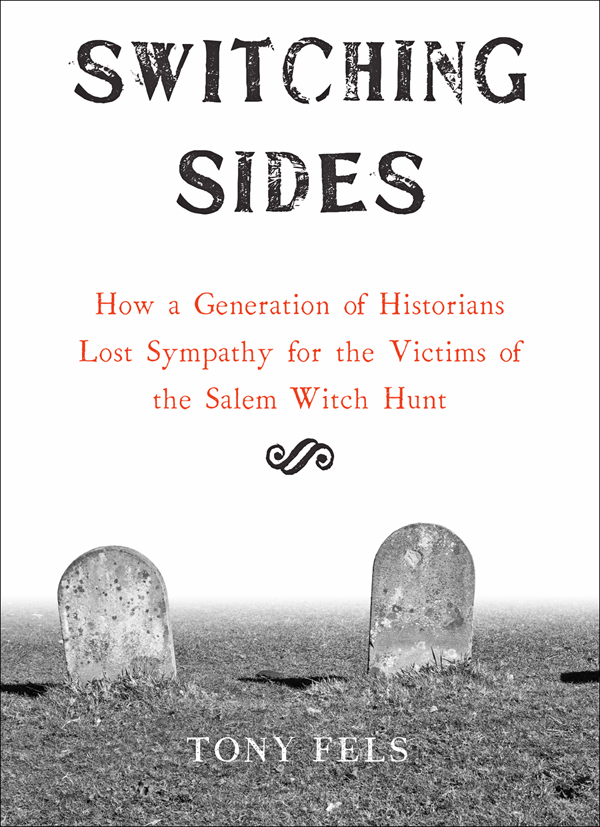
Switching Sides
SWITCHING SIDES

How a Generation of Historians Lost Sympathy for the Victims of the Salem Witch Hunt
TONY FELS
Johns Hopkins University Press
Baltimore
2018 Johns Hopkins University Press
All rights reserved. Published 2018
Printed in the United States of America on acid-free paper
2 4 6 8 9 7 5 3 1
Johns Hopkins University Press
2715 North Charles Street
Baltimore, Maryland 21218-4363
www.press.jhu.edu
Library of Congress Cataloging-in-Publication Data
Names: Fels, Tony, 1949 author.
Title: Switching sides : how a generation of historians lost sympathy for the victims of the Salem witch hunt / Tony Fels.
Description: Baltimore : Johns Hopkins University Press, 2018. | Includes bibliographical references and index.
Identifiers: LCCN 2017016625| ISBN 9781421424378 (pbk. : alk. paper) | ISBN 9781421424385 (electronic) | ISBN 1421424371 (pbk. : alk. paper) | ISBN 142142438X (electronic)
Subjects: LCSH: WitchcraftMassachusettsSalemHistory19th century. | Trials (Witchcraft)MassachusettsSalemHistory19th century.
Classification: LCC BF1576 .F45 2017 | DDC 133.4/3097445dc23
LC record available at https://lccn.loc.gov/2017016625
A catalog record for this book is available from the British Library.
Special discounts are available for bulk purchases of this book. For more information, please contact Special Sales at 410 -- 6936 or specialsales@press.jhu.edu.
Johns Hopkins University Press uses environmentally friendly book materials, including recycled text paper that is composed of at least 30 percent post-consumer waste, whenever possible.
But what, the reader may ask, does causal attribution have to do with ethics or moral sensibility? Everything, for they are two sides of the same coin. To be an agent is to be causally efficacious, a producer of intended consequences. To hold people responsible is to presume that they are causally efficacious agents and therefore capable (within limits) of choosing which consequences to produce. Judgments of praise, blame, responsibility, liability, courage, cowardice, originality, deliberateness, and spontaneity are just a few of the quintessentially ethical qualities that ride piggyback on perceptions of cause and effect.
Thomas L. Haskell, Objectivity Is Not Neutrality
Contents
APPENDIX 1.
Data Points on Boyer and Nissenbaums Geography of Witchcraft Map
APPENDIX 2.
Chronological List of Accused Suspects in Salem Witch Hunt
Figures
Preface
The following pages offer an essay in historical interpretation. Historians call this facet of their interests by one of the few technical terms of their trade, historiography. Literally the study of historical writing, historiography emphasizes not the events of the past and their causesthe standard subject matter of the discipline of historybut rather how historians construct their narratives and explanations of these events. The aim of all historical analysis is to uncover the truth about the past, but since the complexity of most human developments, especially as they recede in time, typically defies the grasp of any single, subsequent scholar or even of any one scholarly era, it becomes useful to notice the selectivity process and assumptions of value underlying each attempt to retell the historical record. This added focus on the interpretative act in the writing of history promotes a deeper understanding of human history itself, because it encourages thinking about the past from multiple angles and also because it calls attention to the ways in which the study of history serves the needs, legitimate or otherwise, of later generations.
My fascination with historiography began along with my earliest interest in history. I can still remember my excitement when my high-school United States history teacher introduced our class to the debate over the meaning of the mid-nineteenth-century Jacksonian movement. One leading historian had characterized the Jacksonian Democrats as champions of the working man, while another had seen the very same politicians as spokesmen for a rising middle class. (Later historians would see Andrew Jackson and his white, male followers principally through the lens of the racial prejudices these men held toward American Indians, African Americans, and Chinese immigrants. And there would be still other interpretations.) From that moment on, I was about equally drawn to learning about the causal relationships of the past as I was to considering the vantage points of the historians from whose works we come to know those relationships. Most of my later academic colleagues would speak about how happy they could be, alone in an archive, immersed in old, yellowed documents that illuminated the past. For me the greatest intellectual thrill came from seeing how the understanding of an era, an empire, a war, or an institution took shape and changed under the influence of scholarly minds.
I cannot remember exactly how I first became engaged by the subject of the Salem witch hunt. However, when early in my university career I had the chance to teach the historical methods course for our undergraduate majors, I decided to refashion it away from the traditional approach of acquainting students with snippets of the great historians (from Herodotus forward) in favor of an exercise that would demonstrate how contemporary historians actually operate. This meant showing how, when one chooses a subject from the past to investigate, one usually begins by acquiring an awareness of the ways that previous historians have conceptualized the field. I picked the Salem witch hunt of 1692 for the class to study. Not only were the documentary sources for students later research projects readily available but the subject matter had generated a wide range of conflicting historical interpretations. For the first part of the course, students read a selection of books and articles, all telling the Salem story in dramatically different ways. Teaching this course over a period of years deepened my own curiosity about the Salem literature and raised a number of historiographical questions, the pursuit of which has formed the substance of this book.
There is also a political dimension to the argument that ensues, as will be readily apparent to readers. For many of the years that I was teaching about Salem, I entertained only a vague sense that something was missing from the principal contemporary accounts. All seemed to slight, to one degree or another, the religious element in the witch hunt. For a social panic to occur among such deeply religious people as the Puritans of New Englanda fear based on the perceived threat of hidden supernatural attackit seemed clear that religious beliefs would have to occupy a central place in any satisfactory explanation. Yet authors of the leading Salem works over the past forty-five years called first upon economic, sociological, psychological, gender-based, ethnic, and political factors to explain the witch hunt. Why, I wondered, had the religious dimension of the events taken a back seat in these accounts?
And then, by chance, developments transpired at my university and within my department that produced a miniwitch hunt of its own, this one based on a modern, secular belief system with characteristics of utopian intolerance similar to those associated with the ideals held by the Puritans. Moreover, these events came with many of the social correlates common to witchcraft accusations of the past: a close community with a history of personal grievances, charismatic individuals who instigate the process, perceived misfortune without easily understood explanations, and a reservoir of guilt inhibiting the ability of people to stand up to the scapegoating that results. Since historians often study scapegoating in many historical settings, I now wondered why most of my colleagues failed to recognize this particular form of the phenomenon when it happened in our very midst. This question led in turn to my realization that a rather unified ideological outlook that had become dominant in the academic world could explain both the myopia of my own colleagues and the deficiencies in the works of the Salem historians. It was not simply the religious element of the witch hunt that had faded from view in the recent Salem literature but the fundamental recognition that a terrible injustice had taken place. My study thus became a deeper criticism of the ideological foundations of an entire scholarly era.


